Module 1 Small Talk period 4 Reading Practice课件
文档属性
| 名称 | Module 1 Small Talk period 4 Reading Practice课件 | 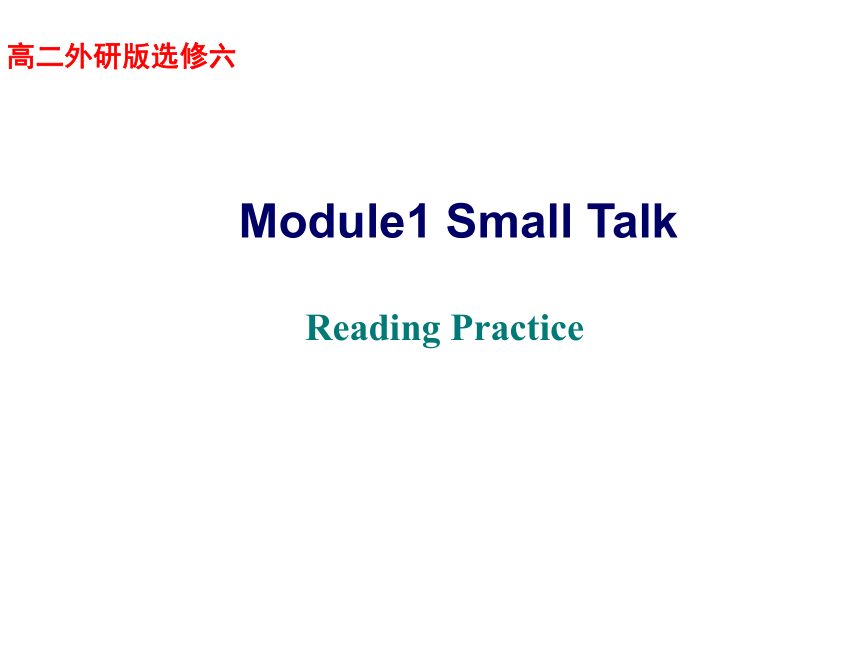 | |
| 格式 | rar | ||
| 文件大小 | 3.6MB | ||
| 资源类型 | 教案 | ||
| 版本资源 | 外研版 | ||
| 科目 | 英语 | ||
| 更新时间 | 2011-04-20 20:58:00 | ||
图片预览

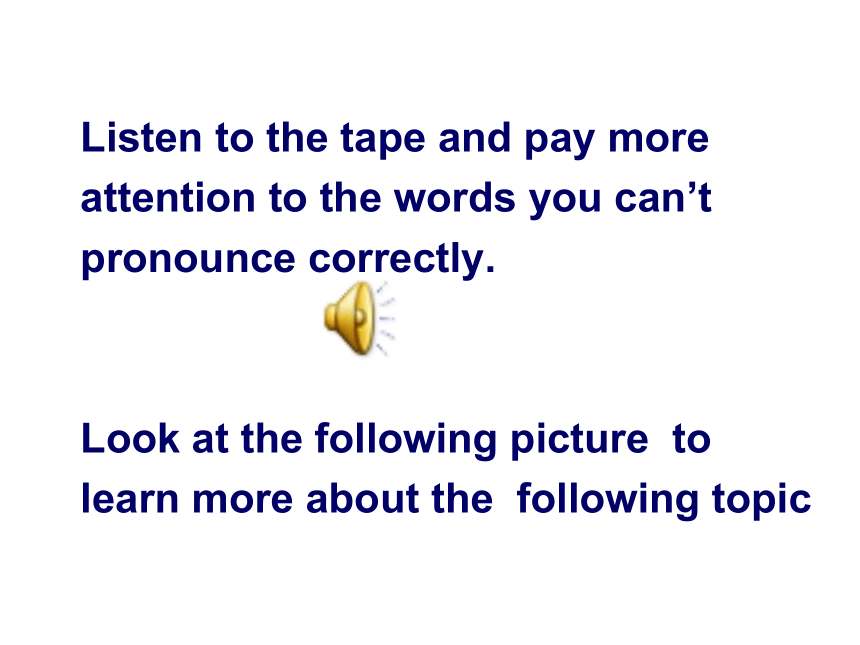

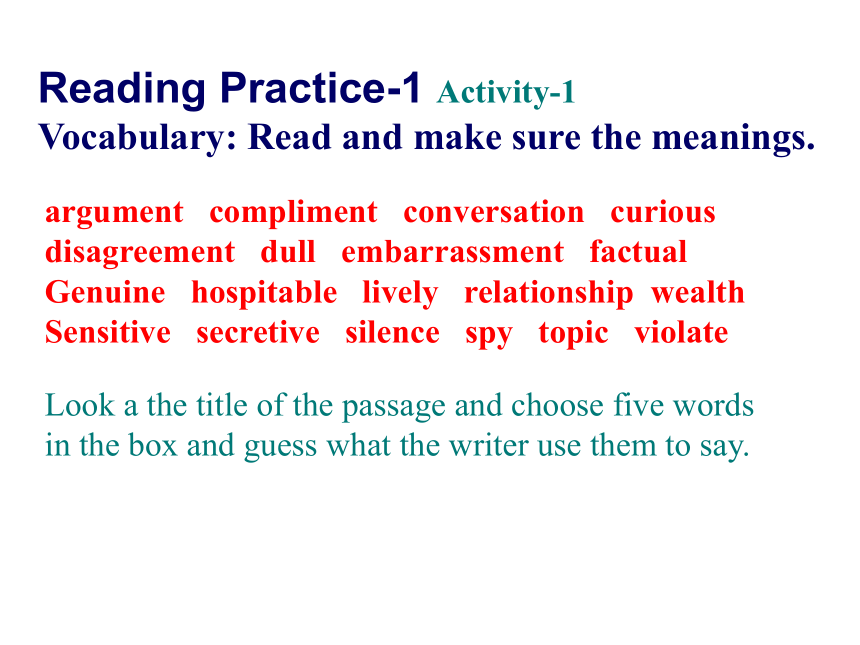
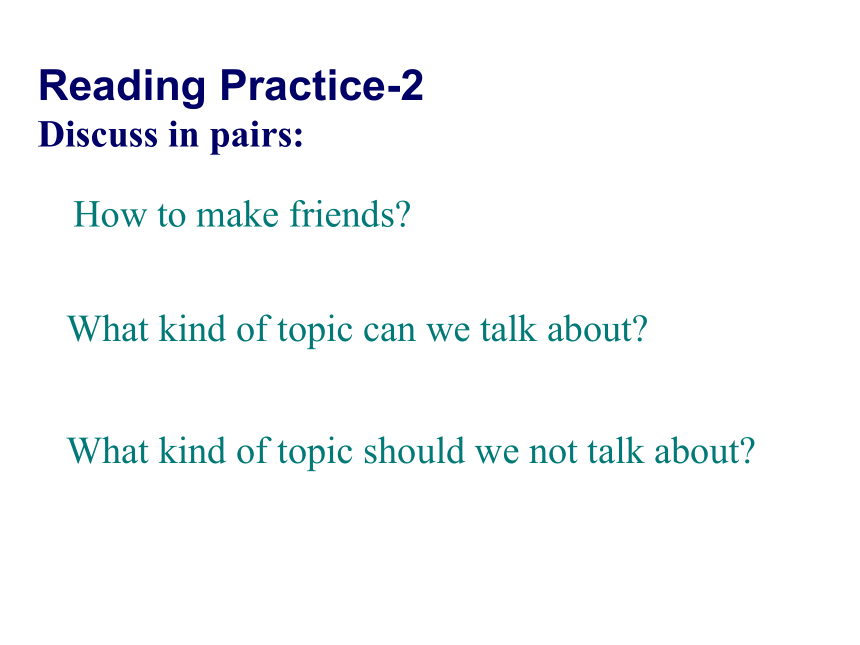
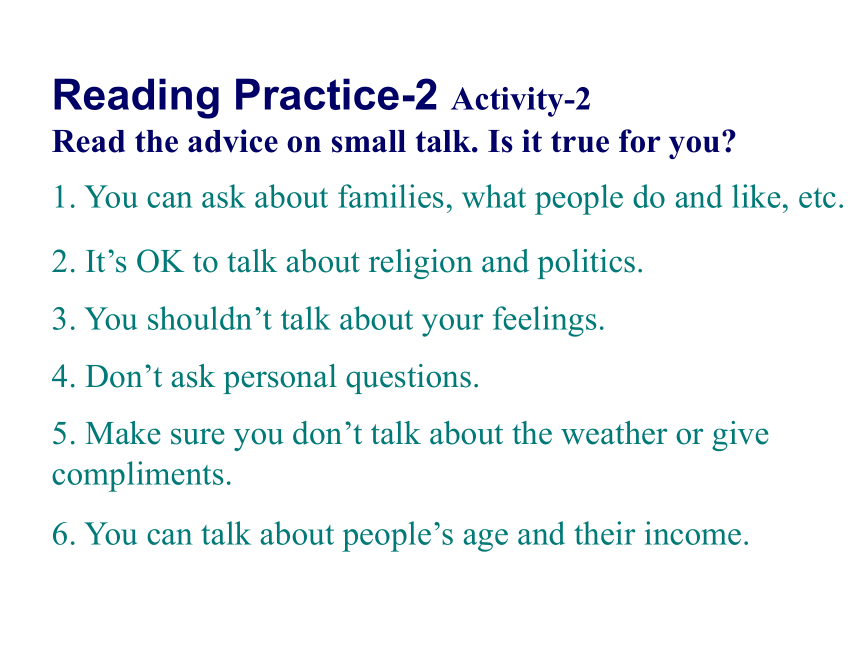
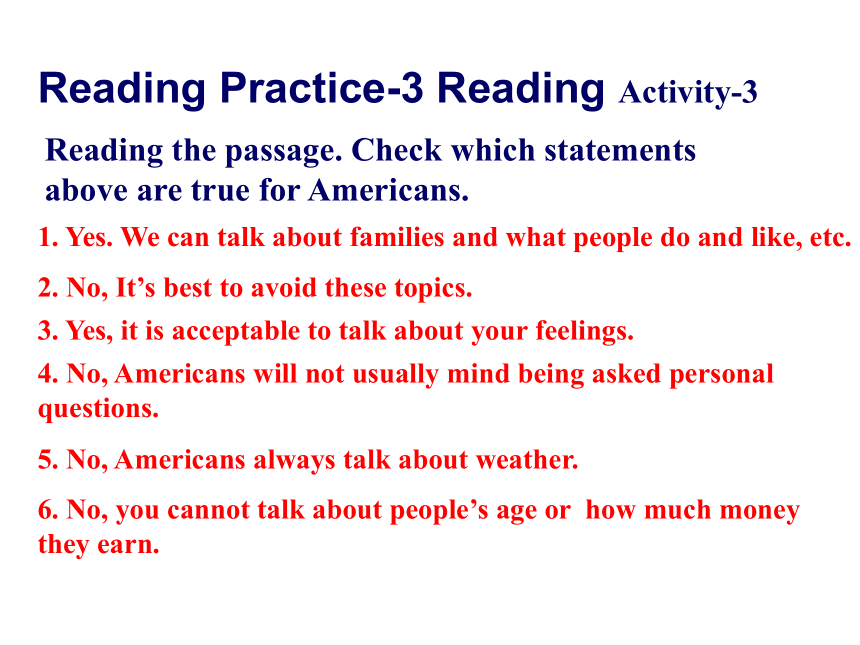
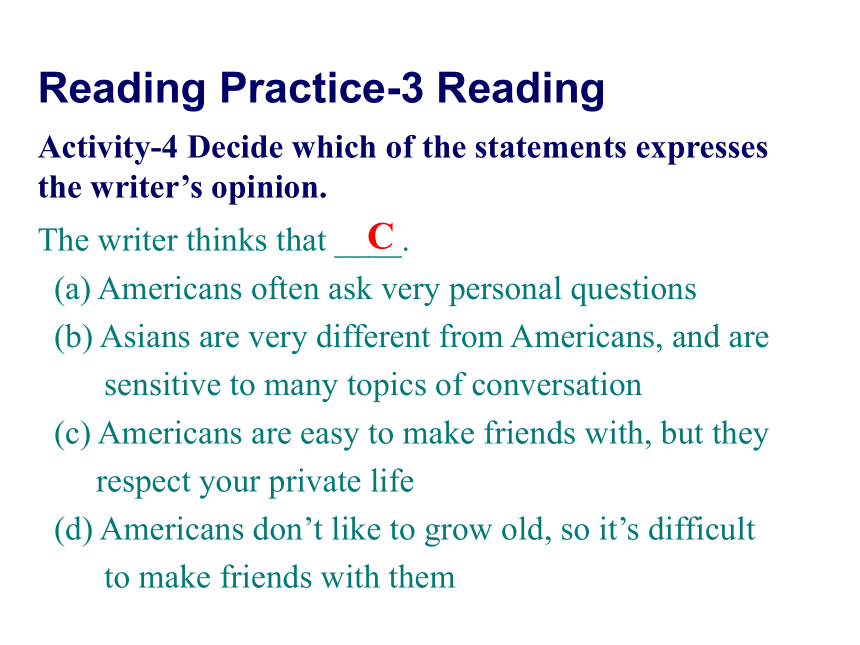
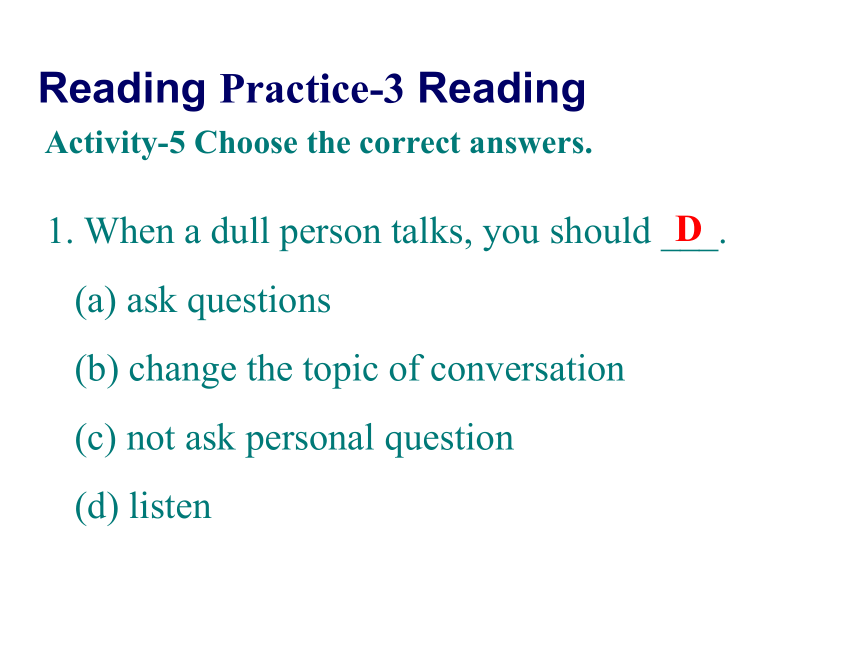
文档简介
课件23张PPT。 Module1 Small Talk
Reading Practice高二外研版选修六Listen to the tape and pay more
attention to the words you can’t
pronounce correctly.
Look at the following picture to
learn more about the following topic
Making Friends in the USAReading Practice-1 Activity-1
Vocabulary: Read and make sure the meanings.argument compliment conversation curious
disagreement dull embarrassment factual
Genuine hospitable lively relationship wealth
Sensitive secretive silence spy topic violateLook a the title of the passage and choose five words
in the box and guess what the writer use them to say.Reading Practice-2
Discuss in pairs:How to make friends?What kind of topic can we talk about?What kind of topic should we not talk about? Reading Practice-2 Activity-2
Read the advice on small talk. Is it true for you?You can ask about families, what people do and like, etc.2. It’s OK to talk about religion and politics.3. You shouldn’t talk about your feelings.4. Don’t ask personal questions.5. Make sure you don’t talk about the weather or give compliments.6. You can talk about people’s age and their income.Reading Practice-3 Reading Activity-3Reading the passage. Check which statements
above are true for Americans.1. Yes. We can talk about families and what people do and like, etc.2. No, It’s best to avoid these topics.3. Yes, it is acceptable to talk about your feelings.4. No, Americans will not usually mind being asked personal questions.5. No, Americans always talk about weather.6. No, you cannot talk about people’s age or how much money they earn.Reading Practice-3 ReadingActivity-4 Decide which of the statements expresses
the writer’s opinion.The writer thinks that ____.
(a) Americans often ask very personal questions
(b) Asians are very different from Americans, and are
sensitive to many topics of conversation
(c) Americans are easy to make friends with, but they
respect your private life
(d) Americans don’t like to grow old, so it’s difficult
to make friends with themCReading Practice-3 ReadingActivity-5 Choose the correct answers.1. When a dull person talks, you should ___.
(a) ask questions
(b) change the topic of conversation
(c) not ask personal question
(d) listenD2. It’s always OK to talk to Americans about ___.
(a) their work
(b) religion and politics
(c) age and money
(d) their private lifeA3. When Americans make an invitation to visit, ___.
(a) they don’t really mean it
(b) they want to find out more about you
(c) they genuinely want to see you again
(d) you should accept itC4. The best way to talk about personal
things is to ____.
(a) talk about your own private life first
(b) talk about your job
(c) discuss the weather
(d) ask them how old they areA5. It’s best to avoid ___.
(a) personal questions
(b) silence
(c) spies
(d) dull peopleBActivity-6. Complete the sentences in your own words.Conversation is less lively in the USA because
everyone . 2. Americans are happy to talk about family and personal interests, but _______________________
__________________________. listens and waits for a turn to speakit’s best to avoid sensitivetopics like religion and politics3. If you show you’re aware of cultural differences,
________________________________________
______________
4. You shouldn’t ask how old people are because
___________________________________________
_____________
5. Although some people like to show off their wealth,
________________________________________________
most Americans will not worry about answering
your questions.Americans always want to look younger than
they really are.income is a very private mater for most Americans.Language PointsWhen someone talks, everyone is expected to
listen, no matter how dull the person’s speaking
maybe. 当一个人发表见解时,不管他说的多么无聊,
其他人都必须洗耳恭听。expect sb. to do 期待某人做Tom is expecting his father to come back.No matter how = however
不管多么… 引导让步状语从句不管它有多好,我都不想买。No matter how wonderful it is, I won’t buy it.不管要花多少时间,我也要做完这项工作。I’ll finish the job, no matter how long it takes.类似表达还有:no matter where 无论哪里
no matter what 无论什么2. We’re defined by our jobs and we’re usually
happy to talk about them, unless you’re a spy!我们受到职业的限制,并且我们都喜欢谈论
我们的职业, 除非你是个间谍。be defined by 受到…的限制总统的权利在宪法中有明确规定。The power of the President is defined in
the constitution.3. If you’re ever in Minneapolis/ San Diego/
Poughkeepsie, do call by and see us.如果你何时到明尼阿波里斯或圣地亚哥或
波基普西,请务必到我家坐坐!1) ever adv. 曾经,无论何时,
一般用于否定句、疑问句、条件状语从句或
特殊疑问句,用来加强语气。你都去哪儿了?Where ever have you been?2)句中do为助动词,置于谓语动词前,起加强语气
的作用。在祈使句中用do强调时表示强烈的请求,
而不是命令,有时可以使邀请的口气更热情、
客气和友好。出门时一定记着带把伞。Do remember to take an umbrella when you are out.请再喝杯咖啡。Do have another cup of coffee.3) call by 顺道拜访 (后常接at)在去邮局的途中她顺道拜访了她的朋友。She called by at her friend’s on the way
to the post office.call on sb. 拜访某人call at a place 拜访某地4. Particularly if you clearly show you’re aware of
cultural differences, they may hesitate before
they ask you similar questions.be aware of/ be aware that +从句
知道,意识到
你察觉到你已经伤害了她的感情了吗?Are you aware that you have hurt her feeling?
Write down the topics which you can and shouldn’t talk about with Americans.
Write a few sentences saying if you can talk about these topics in China.Homework
Reading Practice高二外研版选修六Listen to the tape and pay more
attention to the words you can’t
pronounce correctly.
Look at the following picture to
learn more about the following topic
Making Friends in the USAReading Practice-1 Activity-1
Vocabulary: Read and make sure the meanings.argument compliment conversation curious
disagreement dull embarrassment factual
Genuine hospitable lively relationship wealth
Sensitive secretive silence spy topic violateLook a the title of the passage and choose five words
in the box and guess what the writer use them to say.Reading Practice-2
Discuss in pairs:How to make friends?What kind of topic can we talk about?What kind of topic should we not talk about? Reading Practice-2 Activity-2
Read the advice on small talk. Is it true for you?You can ask about families, what people do and like, etc.2. It’s OK to talk about religion and politics.3. You shouldn’t talk about your feelings.4. Don’t ask personal questions.5. Make sure you don’t talk about the weather or give compliments.6. You can talk about people’s age and their income.Reading Practice-3 Reading Activity-3Reading the passage. Check which statements
above are true for Americans.1. Yes. We can talk about families and what people do and like, etc.2. No, It’s best to avoid these topics.3. Yes, it is acceptable to talk about your feelings.4. No, Americans will not usually mind being asked personal questions.5. No, Americans always talk about weather.6. No, you cannot talk about people’s age or how much money they earn.Reading Practice-3 ReadingActivity-4 Decide which of the statements expresses
the writer’s opinion.The writer thinks that ____.
(a) Americans often ask very personal questions
(b) Asians are very different from Americans, and are
sensitive to many topics of conversation
(c) Americans are easy to make friends with, but they
respect your private life
(d) Americans don’t like to grow old, so it’s difficult
to make friends with themCReading Practice-3 ReadingActivity-5 Choose the correct answers.1. When a dull person talks, you should ___.
(a) ask questions
(b) change the topic of conversation
(c) not ask personal question
(d) listenD2. It’s always OK to talk to Americans about ___.
(a) their work
(b) religion and politics
(c) age and money
(d) their private lifeA3. When Americans make an invitation to visit, ___.
(a) they don’t really mean it
(b) they want to find out more about you
(c) they genuinely want to see you again
(d) you should accept itC4. The best way to talk about personal
things is to ____.
(a) talk about your own private life first
(b) talk about your job
(c) discuss the weather
(d) ask them how old they areA5. It’s best to avoid ___.
(a) personal questions
(b) silence
(c) spies
(d) dull peopleBActivity-6. Complete the sentences in your own words.Conversation is less lively in the USA because
everyone . 2. Americans are happy to talk about family and personal interests, but _______________________
__________________________. listens and waits for a turn to speakit’s best to avoid sensitivetopics like religion and politics3. If you show you’re aware of cultural differences,
________________________________________
______________
4. You shouldn’t ask how old people are because
___________________________________________
_____________
5. Although some people like to show off their wealth,
________________________________________________
most Americans will not worry about answering
your questions.Americans always want to look younger than
they really are.income is a very private mater for most Americans.Language PointsWhen someone talks, everyone is expected to
listen, no matter how dull the person’s speaking
maybe. 当一个人发表见解时,不管他说的多么无聊,
其他人都必须洗耳恭听。expect sb. to do 期待某人做Tom is expecting his father to come back.No matter how = however
不管多么… 引导让步状语从句不管它有多好,我都不想买。No matter how wonderful it is, I won’t buy it.不管要花多少时间,我也要做完这项工作。I’ll finish the job, no matter how long it takes.类似表达还有:no matter where 无论哪里
no matter what 无论什么2. We’re defined by our jobs and we’re usually
happy to talk about them, unless you’re a spy!我们受到职业的限制,并且我们都喜欢谈论
我们的职业, 除非你是个间谍。be defined by 受到…的限制总统的权利在宪法中有明确规定。The power of the President is defined in
the constitution.3. If you’re ever in Minneapolis/ San Diego/
Poughkeepsie, do call by and see us.如果你何时到明尼阿波里斯或圣地亚哥或
波基普西,请务必到我家坐坐!1) ever adv. 曾经,无论何时,
一般用于否定句、疑问句、条件状语从句或
特殊疑问句,用来加强语气。你都去哪儿了?Where ever have you been?2)句中do为助动词,置于谓语动词前,起加强语气
的作用。在祈使句中用do强调时表示强烈的请求,
而不是命令,有时可以使邀请的口气更热情、
客气和友好。出门时一定记着带把伞。Do remember to take an umbrella when you are out.请再喝杯咖啡。Do have another cup of coffee.3) call by 顺道拜访 (后常接at)在去邮局的途中她顺道拜访了她的朋友。She called by at her friend’s on the way
to the post office.call on sb. 拜访某人call at a place 拜访某地4. Particularly if you clearly show you’re aware of
cultural differences, they may hesitate before
they ask you similar questions.be aware of/ be aware that +从句
知道,意识到
你察觉到你已经伤害了她的感情了吗?Are you aware that you have hurt her feeling?
Write down the topics which you can and shouldn’t talk about with Americans.
Write a few sentences saying if you can talk about these topics in China.Homework
